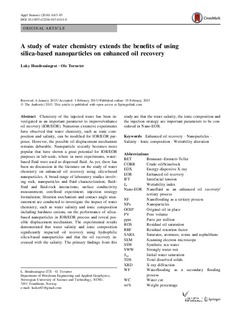| dc.contributor.author | Hendraningrat, Luky | |
| dc.contributor.author | Torsæter, Ole | |
| dc.date.accessioned | 2019-11-13T10:29:03Z | |
| dc.date.available | 2019-11-13T10:29:03Z | |
| dc.date.created | 2015-03-12T13:43:03Z | |
| dc.date.issued | 2015 | |
| dc.identifier.citation | Applied Nanoscience. 2015, . | nb_NO |
| dc.identifier.issn | 2190-5509 | |
| dc.identifier.uri | http://hdl.handle.net/11250/2628145 | |
| dc.description.abstract | Chemistry of the injected water has been investigated as an important parameter to improve/enhance oil recovery (IOR/EOR). Numerous extensive experiments have observed that water chemistry, such as ionic composition and salinity, can be modified for IOR/EOR purposes. However, the possible oil displacement mechanism remains debatable. Nanoparticle recently becomes more popular that have shown a great potential for IOR/EOR purposes in lab-scale, where in most experiments, water-based fluid were used as dispersed fluid. As yet, there has been no discussion in the literature on the study of water chemistry on enhanced oil recovery using silica-based nanoparticles. A broad range of laboratory studies involving rock, nanoparticles and fluid characterization; fluid–fluid and fluid-rock interactions; surface conductivity measurement; coreflood experiment; injection strategy formulation; filtration mechanism and contact angle measurement are conducted to investigate the impact of water chemistry, such as water salinity and ionic composition including hardness cations, on the performance of silica-based nanoparticles in IOR/EOR process and reveal possible displacement mechanism. The experimental results demonstrated that water salinity and ionic composition significantly impacted oil recovery using hydrophilic silica-based nanoparticles and that the oil recovery increased with the salinity. The primary findings from this study are that the water salinity, the ionic composition and the injection strategy are important parameters to be considered in Nano-EOR. | nb_NO |
| dc.language.iso | eng | nb_NO |
| dc.publisher | Springer Verlag | nb_NO |
| dc.rights | Navngivelse 4.0 Internasjonal | * |
| dc.rights.uri | http://creativecommons.org/licenses/by/4.0/deed.no | * |
| dc.title | A study of water chemistry extends the benefits of using silica-based nanoparticles on enhanced oil recovery. | nb_NO |
| dc.type | Journal article | nb_NO |
| dc.type | Peer reviewed | nb_NO |
| dc.description.version | publishedVersion | nb_NO |
| dc.source.pagenumber | 13 | nb_NO |
| dc.source.journal | Applied Nanoscience | nb_NO |
| dc.identifier.doi | 10.1007/s13204-015-0411-0 | |
| dc.identifier.cristin | 1231640 | |
| dc.description.localcode | © The Author(s) 2015 Open Access This article is distributed under the terms of the Creative Commons Attribution License which permits any use, distribution, and reproduction in any medium, provided the original author(s) and the source are credited. | nb_NO |
| cristin.unitcode | 194,64,90,0 | |
| cristin.unitname | Institutt for geovitenskap og petroleum | |
| cristin.ispublished | true | |
| cristin.fulltext | original | |
| cristin.qualitycode | 1 | |

